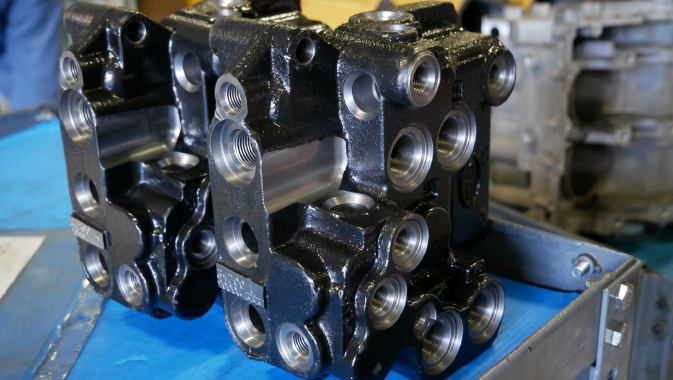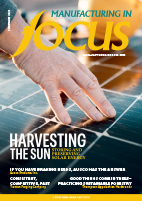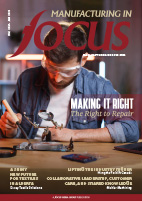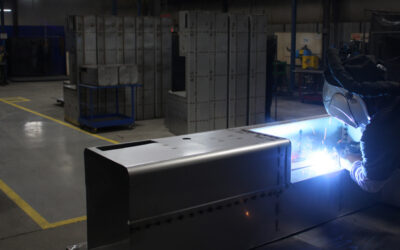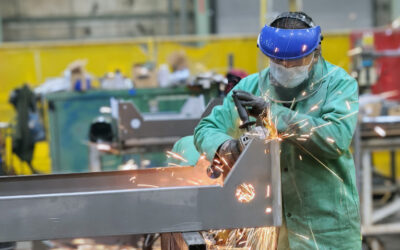In precision engineering, one failure is enough to cause long and expensive product delays or recalls. However, on the shores of Lake Michigan, Manitowoc Tool & Machining has built a reputation for precise, high-volume output thanks to its ongoing embrace of new technologies. Today, the company is moving above and beyond into aerospace as it expands its machining capabilities.
Founded in 1965 as Manitowoc Tool & Die, the young company quickly found its niche in building dies and general machining. It soon doubled its plant size, adopting its first computerized numerical control (CNC) machines in 1979. As years passed, the company’s workforce ballooned from two to 280, and it rebranded itself as Manitowoc Tool & Machining to express its unique capabilities better.
Today, it operates around the clock, with a second building for customer inventory and storage in addition to its primary manufacturing plant. With the two facilities combined, MTM occupies approximately 300,000 square feet of usable shop space, making it one of the largest CNC machine shops in the nation.
Manitowoc’s split into separate manufacturing and machining divisions reflected the company’s desire to cater to different types of customers with equally different requirements. The manufacturing division’s increasingly heavy equipment produced significant seismic vibrations, which could potentially disrupt the delicate machining process.
“We essentially ran out of room in this building,” Sales Manager Tyler Reed explains, elaborating that the split allows each division to grow more organically according to its customers’ needs. “Even though we’re on the same block, we’re essentially different companies.”
MTM has experienced tremendous growth since 1994, when current President Scott Mertens took the reins of leadership from his father Wayne Mertens, who co-founded the company. “Through his direction and management, he grew the company’s revenue approximately 35 times what it was and increased the number of employees three-fold,” he says.
Due to Manitowoc’s large size and experience in machining, it has among the top machining capacities in the industry and can machine parts up to ten tons in weight. Over 150 CNC machine centers offer high product runs, giving the company versatility and the ability to machine and distribute precision parts across North America for a variety of industries.
Reed says the company has a philosophy to never turn down a job, even if it may strain resources. “If we’re extremely busy here and we have limited capacity, we’ll figure out a way to do it, whether that means buying a brand new machine and placing it on the floor to complete a job or even taking on another building – which we’ve done in the past,” he remarks. “We’re always looking forward into the future and trying to grow and expand our business.”
For quality assurance, engineers regularly review all customer projects from print to finish and beyond. The engineers communicate effectively as a group to ensure no details are lost during machining or finishing. Each project is also monitored via bar code to ensure traceability down to the smallest detail. Innovative manufacturing cells, computerized quotations, and certified inspections provide unmatched efficiencies and flexibility. These processes demonstrate MTM’s commitment to quality and customer service.
Keeping up with the latest technology has always been a cornerstone of the company’s business model. MTM routinely replaces its older CNC machines centers with the latest from Mazak, DMG Mori and Haas. On the inspection side the team utilizes precision coordinate measuring tools by ZEISS, Brown & Sharpe, and Hexagon, among others. Since so many of these parts are used in high-performance sectors such as aerospace, defense, marine and automotive, their quality is more than merely a product of the company’s vast experience; it is a must.
MTM operates predominantly Mazak machines, which Reed calls “the Ferrari of machine centers,” on its factory floor. He says that using lower-end machines would betray its mission of providing the highest level of precision and quality available. It may be better traditionally for a company’s bottom line to use lower-end machines, but MTM spares no expense to utilize the “latest and greatest,” in Reed’s words, for its production capabilities.
As part of this commitment, the team uses two advanced machine cells from German firm EMAG. These robotic assemblies allow them to produce a significant automotive part for a major unnamed OEM through automation. The versatile robots are able to independently stack and move parts as they come down a conveyor belt, providing unprecedented speed and efficiency.
“It’s allowed us to save a lot of time and money on that particular job,” Reed says. This has enhanced MTM’s record for precision, as Reed notes that “there’s no margin for error on those parts.”
MTM currently has implemented six of Mazak’s PALLATECH systems, with a seventh being installed this year. These enable a single operator to simultaneously operate five to seven machines at one time. These systems have greatly increased the company’s machining efficiencies, without sacrificing quality.
As a measure of its record of precision and quality, the company has now officially moved into the aerospace sector. It recently received its AS9100 certification from inspecting agency Perry Johnson Registrars, after a ten-year auditing process. PJR’s auditors analyzed safety and maintenance records on all machines. They also examined prints, plans, and machine programming, before finally analyzing current jobs to ensure MTM’s work met with the utmost quality standards.
Reed admits that this arduous certification was not strictly necessary for MTM to work in aerospace; however, legally, any aerospace client would have had to have been informed of the company’s lack of sector credentials. Therefore, since MTM already producing Aerospace grade parts, it made perfect sense to acquire the formal AS9100D certification. This further expressed their commitment to the high precision and tolerances required of aerospace parts. “We could prove to [auditors] that we could hold those tolerances and produce a part to aerospace spec,” Reed explains, “so that was taken into consideration on making the final decision on whether we could receive it.”
Like its expansion into CNC back in the late 70s, Reed and his colleagues see this move into aerospace as a natural progression of the company’s abilities as there is an ever-increasing competition in machining, both domestically and abroad. “It’s never been cheaper to buy a used CNC machine center and start your own machine shop. Twenty years ago, that would have been a lot more difficult.” With the move into aerospace, MTM is outmaneuvering its rivals to meet precision and reliability standards not held by most shops its size.
As MTM enters this bold new sector, the company is already moving to add innovative machines to its production line. A new five-axis Mazak machine is currently entering service, which will aid in the machining of Aerospace parts and other higher end projects. The company also aims to move into three-dimensional (3D) metal printing and plans to have a printer in operation by the third quarter of this year. These actions come on the heels of more environmentally friendly measures such as incorporating LED lighting and biodegradable coolants.
While MTM is fortunate to enjoy loyal employees, even the most skilled workers must retire. “Our workforce in the shop is a pretty happy bunch, and turnover is low,” Reed states. “But as more and more retire, we’re looking to fill that space with young, inspiring individuals who are interested in this type of work.”
Wisconsin currently has a low unemployment rate, which makes this difficult, so MTM operates an apprenticeship program, which brings in talented individuals with a passion for engineering and machining. “Once they’ve graduated and have earned their papers, they can work full-time here and earn benefits,” Reed concludes. This path provides a direct entry into a stable career in the industry.
As MTM approaches its fifty-fifth anniversary, the company remains secure in its niche, content in its abilities despite increased competition both domestically and abroad. As a result of their policies regarding continuous improvement to their capabilities, certifications and customer service, the team is sure to continue to provide high quality precision parts for their clients.

